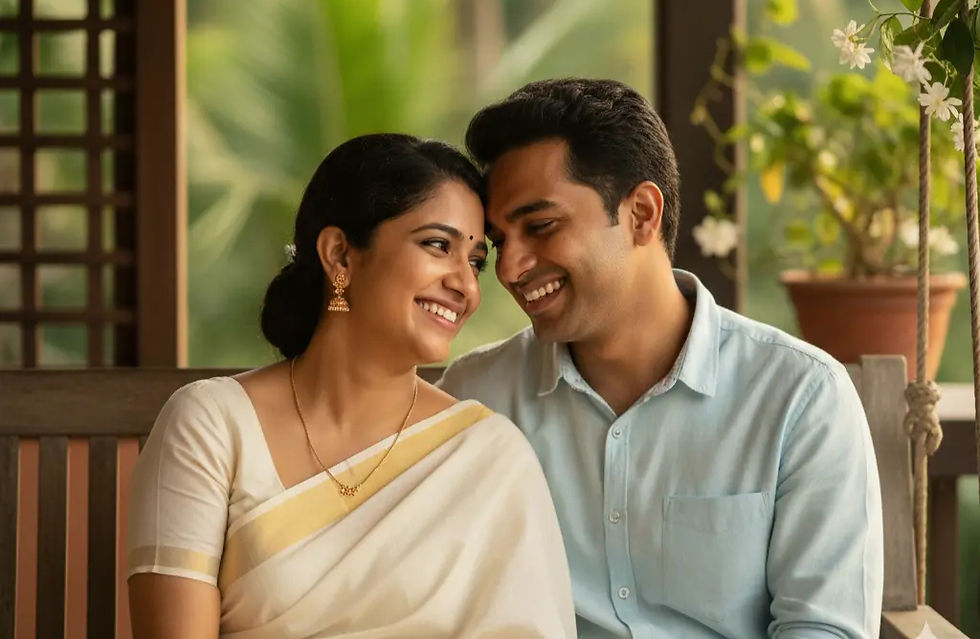Partners share similar mental health patterns: Why marital and pre-marital counseling is essential?
- Ann Maria Thomson

- Sep 24, 2025
- 4 min read

Have you ever noticed that married couples start to look alike?
I’m sure most of us have heard of this or have seen couples from our own families looking like ‘long-lost twins’. Look-alike couples aren’t a joke; they’re a real phenomenon. Couples may strongly resemble each other in terms of hair color, complexion, smiles, facial expressions, and so on. There are many possible explanations for this phenomenon, but one widely accepted explanation is that we’re attracted to partners with similar features due to genetic similarity, shared ancestry, or familiarity associated with comfort. A 2013 study was conducted to understand this phenomenon. Individuals were shown images of their romantic partner’s face that were digitally altered to include some features from random other faces or the participant’s own face. The results supported the earlier hypothesis, as both male and female participants consistently rated images that included their own faces as the most attractive.
How Mental Health is Connected Between Couples
Now, what if I told you married couples share similar mental health patterns? Will you believe it or not?
Although it may sound surprising, it is indeed true, according to a recent study. An international study spanning people born from the 1930s through the 1990s and covering over 5 million spousal pairs in Taiwan, Denmark, and Sweden revealed something unusual.
This research, published in Nature Human Behaviour, examined nine psychiatric disorders (Schizophrenia, Bipolar disorder, Depression, Anxiety, ADHD, Autism, OCD, Substance-use disorder, and Anorexia nervosa) and found that if one partner has any of these issues, the other has an elevated risk of having it too, either the same disorder or a different but related one. The study showed that there is a consistent correlation between partners across different cultures and generations. Spousal correlation refers to the fact that when one spouse is diagnosed with any one of these disorders, the chance that the other spouse also has a psychiatric disorder is significantly higher than random or chance. The chances of same-disorder correlation (both partners having the same disorder) are especially strong in many cases. The study also pointed out that children whose both parents were diagnosed with the same psychiatric illness are at higher risk of developing the illness than those with only a single affected parent.
Why Do Couples Share Mental Health Patterns?

The authors suggested three possible causes to explain this correlation:
People are likely to be attracted to other individuals, not just in terms of physical appearance or educational status, but also in terms of possible mental health traits.
Shared environments could be another reason. Family stress, financial pressures, childcare responsibilities, work pressures, and more may contribute to increased risk of developing psychological problems or worsening of problems previously undiagnosed or mild.
Due to societal stigma, individuals with psychiatric disorders may have a smaller pool of potential partners, increasing the chance of marrying someone with similar conditions.
Although this study did not include the Indian population, it is important to note that the study holds true for all cultures. Especially in a tight-knit society like the one in India, this study holds even more relevance. Psychiatric and psychological conditions are widespread in our country, yet it is often ignored due to the stigma attached to such conditions. This study shows how early detection can save lives and why marital and pre-marital counseling is more effective than one thinks. Individual counseling is undoubtedly necessary in dealing with psychological disorders; however, in the case of marriage or long-term partnerships, individual therapy, along with couples therapy, can prove to be beneficial for both partners involved and increase the effectiveness of the therapy.
Why Marital Counseling in India is Important
Marital counseling (couples therapy) is not just for struggling couples. It is for any couple who wants to:
Improve communication and emotional intimacy
Resolve conflicts effectively
Build healthy boundaries with family/in-laws
Rebuild trust after challenges like infidelity
Manage transitions such as parenthood, migration, or career shifts
A therapist provides a safe, confidential space for partners to express themselves and work through issues without judgment.
Why Pre-Marital Counseling in India Matters
Pre-marital counseling is especially relevant in India, where arranged marriages are still common. It prepares couples by helping them:
Discuss expectations and values
Set financial plans and shared responsibilities
Understand family roles and cultural influences
Plan for children and career goals
Learn conflict-resolution strategies
By addressing these early, pre-marital therapy reduces future conflicts and strengthens the foundation of marriage.
Is marital counseling only for struggling couples?
If you say yes, then you’re wrong. You definitely need to seek marital counseling if you’re going through issues like:
Persistent disagreements and conflicts
Ineffective communication
Trust issues due to infidelity or other issues
Problems with in-laws, lack of proper boundaries
Disagreements over childcare or home responsibilities
Lack of individual space
Navigating major life changes or stressors such as migration, the death of a loved one, promotion, etc.

But marital counseling is not just for couples dealing with these issues, but also for couples who want to strengthen their existing relationship. Slight modifications to various aspects of their relationship can create a happier, long-lasting relationship.
Happily ever after is a myth. A fantasy began with fairytales, princes, and princesses.
While Koott can’t promise you a happily ever after, we can promise to bring you closer to your happily ever after. Our team of relationship therapists can support you in times of marital distress. We offer both marital counseling and pre-marital counseling, utilizing techniques such as Cognitive Behavioral Therapy (CBT), Gottman Method, Emotion-Focused Therapy (EFT), and more. Through these approaches, we enable you to create a happier, more fulfilling relationship. If you are someone struggling in your relationship or are preparing for your big day, Koott has got you.







Comments